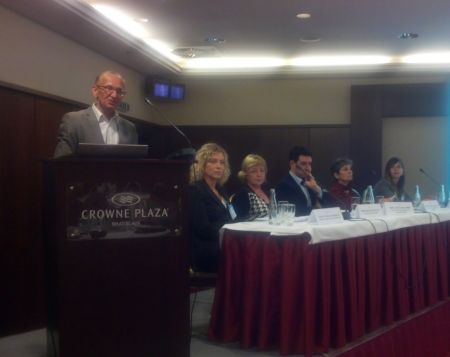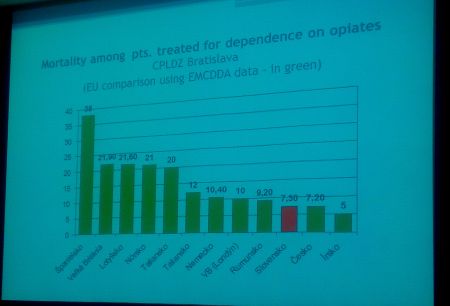A critical view on legal barriers and the need for trust – the ATOME Slovakia National Symposium on Access to Opioid Medication
Eugenia Larjow, sociologist at the University
Hospital of Bonn, Germany, and member of the ATOME (Access to Opioid
Medication in Europe) Project Management Team.

Dr
Ľubomír Okruhlica Director, Centre for Drug Dependence Treatment
Bratislava, presented some epidemiological results based on the EU-
funded project, Improvement of Access to Treatment for People with
Alcohol- and Drug-Related Problems.
(Photograph: Katherine Pettus)
(Photograph: Katherine Pettus)
Nearly 60 people participated in the ATOME conference held in Bratislava on Tuesday, 25th
March 2014, including representatives of the Ministry of Health,
physicians and experts from palliative care, pain management and harm
reduction.
“At the beginning I was sceptical, but then I noted people
look at me differently, not as a ‘drug addict’. My family accepted me
back. I look and feel better. Two years ago I was on the street and on
my own. Methadone saved me.”
This is one example of how patients in Slovakia assess their
methadone maintenance treatment. Nevertheless, regulatory barriers such
as formal documents increase the threshold for access to treatment.
Absence of Opioid Agonist Therapy (OAT) in prison, no willingness to
prescribe and no access to programmes outside Bratislava are some of the
parameters that challenge substitution therapy in Slovakia. However,
general epidemiological parameters show a good situation compared to
other countries. The insurance system with OAT being free of charge was
highlighted as a positive aspect of harm reduction in Slovakia.
With regards to opioid therapy in palliative care, a lack of trust
towards the expertise of palliative care professionals was demonstrated.
Education and sustainability in palliative care services are necessary
to handle ‘palliaphobia’. Establishment of networks would be very
important. Changes related to prescription restrictions for palliative
specialists and reimbursement of mobility costs would also improve the
situation of palliative care in Slovakia.
The discussion about the review of the legislation related to opioid
prescription, dispensing and use was an important part of the
conference. A representative of the Ministry of Health emphasised the
influence of European guidelines on Slovakian opioid regulations.
Professor Sheila Payne, President of the European Association for
Palliative Care, concluded the conference by highlighting the main
messages such as transfer of knowledge to relevant faculties at the
universities and increases in the number of palliative care beds, but
also revision of the legislation at least in some points.
To find out more…
Click here for more information about the ATOME project. You can also read several other posts on the EAPC blog about previous ATOME meetings.
Click here for more information about the ATOME project. You can also read several other posts on the EAPC blog about previous ATOME meetings.

No comments:
Post a Comment